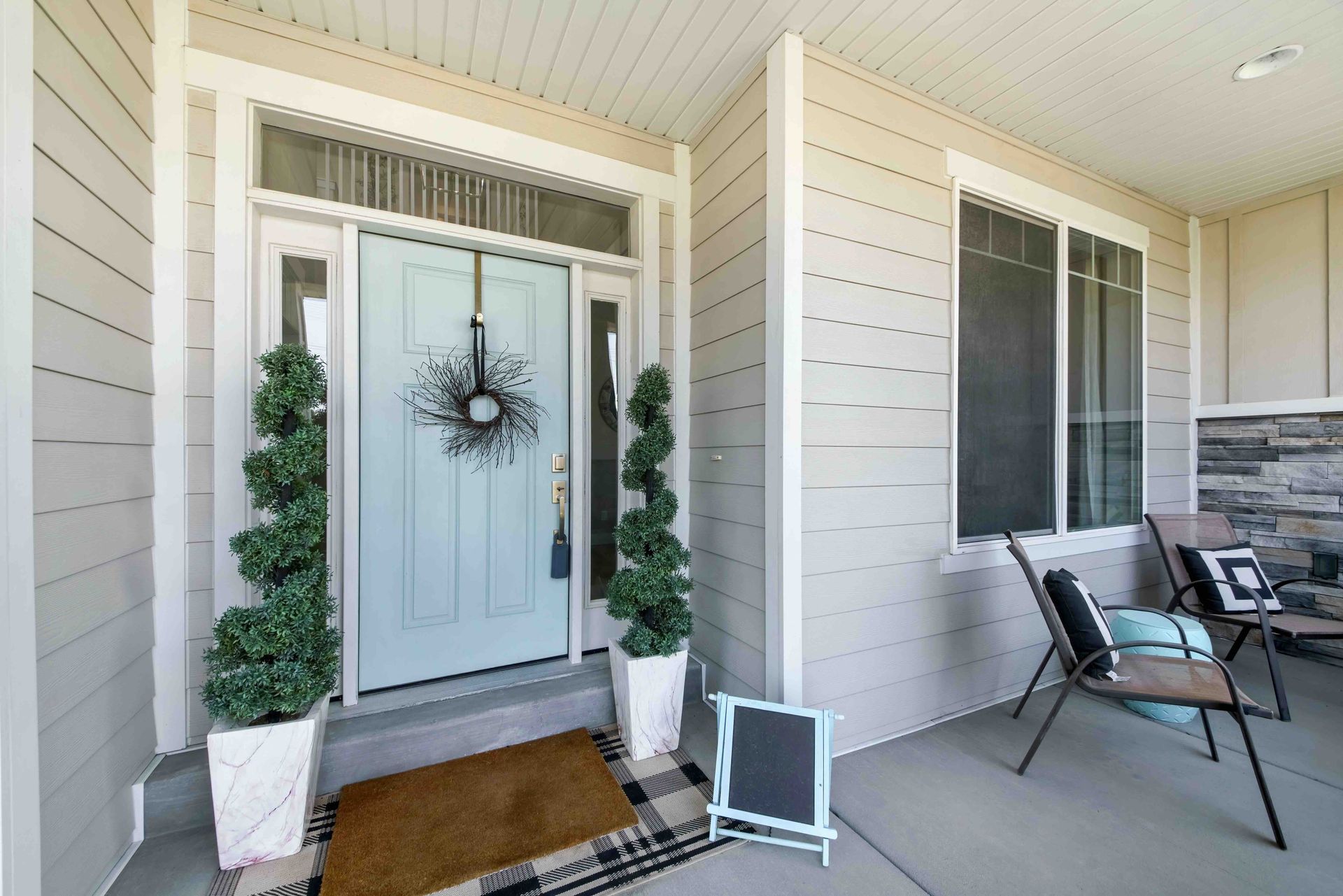Conquer Your First Home: 5 Top Tips for New Buyers
Buying a home is a monumental achievement, marking a significant step towards stability and growth. Yet, for first-time buyers, the process can feel overwhelming. Navigating unfamiliar territory – mortgages, inspections, legalese – can be intimidating. But fear not, intrepid homebuyer! With the proper knowledge and preparation, you can transform the homebuying journey from a daunting maze to an exciting path. Here are five top tips to empower you on your quest for your dream home:
Financial Fitness
Before diving headfirst into house hunting, assessing your financial health is crucial. A home is a significant investment, and ensuring your finances are in top shape will make the process smoother and less stressful. Here's how to get your finances in fighting form:
Know Your Numbers
Understanding your income and expenses is paramount. Create a budget that outlines your monthly income, essential expenses (rent, utilities, groceries), and discretionary spending. This will help you determine a comfortable mortgage payment and how much you can save for a down payment.
Credit Check-Up
Your credit score significantly impacts the mortgage interest rate for which you qualify. A higher credit score translates to a lower interest rate, ultimately saving you thousands of dollars over the life of your loan. Several months before house hunting, obtain a copy of your credit report from all three major credit bureaus and address any errors or delinquencies. Consider paying down existing debt to improve your credit score.
Get Pre-Approved
Don't walk into a bidding war unarmed. Pre-approval from a mortgage lender establishes your borrowing power and demonstrates seriousness to sellers. The pre-approval process involves verifying your income, employment, and creditworthiness, providing a clear picture of the loan amount you can qualify for.
Saving Savvy
Building a down payment is often the biggest hurdle for first-time buyers. Aim to save at least 20% of the desired home's purchase price. This reduces the amount you need to borrow and eliminates the need for private mortgage insurance (PMI). Consider exploring down payment assistance programs offered by government agencies or local lenders, which can provide grants or loans to help bridge the down payment gap.
Assembling Your A-Team
The home-buying process involves several moving parts, and having the right professionals by your side makes all the difference. Consider these key players:
Real Estate Agent
A skilled real estate agent is your advocate and guide throughout the journey. They possess in-depth knowledge of the local market, can help you navigate the intricacies of contracts and negotiations, and provide valuable insights into potential properties. Look for an agent who specializes in your desired area and caters to first-time buyers. Contact us at 616.341.7231 to embark on a rewarding real estate journey with the Cornerstone Home Group.
Mortgage Lender
Choosing the right mortgage lender is crucial. Compare rates and terms from different lenders, both banks and credit unions. Work with a lender who is patient and can explain complex financial concepts clearly and concisely. Ensure they offer the type of mortgage product best suited to your needs and economic situation.
Home Inspector
Don't be fooled by a home's charming facade. A qualified home inspector will thoroughly examine the property and uncover any hidden structural issues, potential problems with plumbing and electrical systems, or any safety hazards. This protects you from unexpected repair costs down the line.
Knowledge is Power: Researching the Market
Educate yourself about the local housing market before embarking on your house hunt. Here's what you need to research:
Market Trends
Before diving into specific properties, take a step back and analyze the bigger picture – your desired housing market's current and historical trends. This analysis provides valuable insights to help you set realistic expectations and make informed decisions throughout your home buying journey. Here are some key market trends to consider:
Average Sales Price and Property Value Appreciation
Research the average sales price of homes similar to the one you're interested in. Look at historical data to understand how property values have appreciated in the area over the past few years. This will help you determine a realistic budget range for your dream home and assess its potential future value as an investment.
Days on Market
The average number of days that properties stay on the market in your desired area is a crucial indicator of market activity. Many days on the market suggest a buyer's market, where you might have more negotiation leverage. Conversely, a low number of days on the market signifies a seller's market, where competition may be fierce and properties might sell quickly above the asking price.
Inventory Levels
The available inventory of homes in your desired area significantly impacts the overall market dynamic. Low inventory levels often lead to bidding wars and drive prices up. Conversely, abundant listings create a buyer's market where you have more options and potentially more negotiating power.
By analyzing these market trends, you can make informed decisions about when to enter the market, how competitive your offer needs to be, and whether the current pricing aligns with your financial goals. Remember, an excellent real estate agent can provide valuable insights into specific market trends and fluctuations within your desired neighborhoods.
Location, Location, Location
The location of your new home extends far beyond the physical address. It encompasses the surrounding community and the overall quality of life it offers. Here are some key factors to consider when evaluating neighborhoods:
Proximity to Essentials
Consider your daily routine and prioritize access to the things that most matter to you. This might include proximity to schools, workplaces, grocery stores, parks, and public transportation options. A shorter commute means more time for yourself and reduced reliance on personal vehicles.
Community Vibe
Every neighborhood has its own personality. Do you crave a vibrant downtown atmosphere with bustling cafes and shops or a quiet suburban setting with well-maintained parks and a strong sense of community? Spend time exploring potential neighborhoods to get a feel for the overall ambiance and resident demographics.
Safety Considerations
A safe and secure environment is paramount. Research crime rates in your desired areas and consider factors like street lighting and neighborhood watch programs. This information is available online through local police department websites or public safety databases.
Remember, location is a long-term investment. While prioritizing affordability is crucial, don't underestimate the value of a neighborhood that aligns with your lifestyle and plans.
Hidden Costs
The purchase price of a home is just the tip of the iceberg. As a first-time homebuyer, it's essential to factor in additional ongoing expenses that contribute to the actual cost of homeownership. Here's a breakdown of some vital hidden costs to consider:
Property Taxes
Your local government levies property taxes, typically calculated as a percentage of your home's assessed value. Research your desired area's average property tax rates to estimate this ongoing expense.
Homeowner's Insurance
This insurance protects your investment from unforeseen events like fire, theft, or weather damage. Premiums vary depending on the property value, location, and type of coverage you choose.
Closing Costs
Closing costs encompass various fees associated with finalizing the purchase of your home. These costs typically range from 2–5% of the purchase price, including loan origination fees, title insurance, appraisals, and escrow fees.
Maintenance and Repairs
Owning a home means taking responsibility for its upkeep—budget for regular maintenance tasks like lawn care, gutter cleaning, and appliance servicing. Additionally, set aside an emergency fund for unexpected repairs that might arise over time.
You'll avoid unpleasant financial surprises by factoring in these hidden costs while determining your budget. Remember, an excellent real estate agent can also provide you with estimates for closing costs and connect you with reliable home inspectors to assess the potential maintenance needs of a property.
The Art of the Offer
Finding your dream home is exciting, but the real test comes when it's time to make an offer. Here are some negotiation strategies to keep in mind:
Understanding Value
Before making an offer, research the fair market value of comparable properties that have recently sold in the neighborhood. This equips you with a strong foundation for negotiation.
Offer with Confidence
Don't be afraid to present an offer below the asking price, especially in a competitive market. However, ensure your offer is reasonable and reflects your research on the property's value.
Contingency Clauses
Contingency clauses protect you from unforeseen circumstances. Typical contingencies include securing mortgage financing and a satisfactory home inspection report.
Be Prepared to Walk Away
While securing your dream home is ideal, it shouldn't come at the expense of your financial well-being. If negotiations break down and the seller's demands exceed your budget or comfort level, be prepared to leave the deal. The right home will come along eventually.

Homeownership Essentials
Congratulations, you've closed on your new home! But the journey doesn't end there. Here's what you need to know about the realities of homeownership
Homeownership Costs
Budget for ongoing expenses associated with your home. This includes property taxes, homeowner's insurance, and routine maintenance costs. Consider setting up an escrow account to ensure timely tax and insurance payments.
Maintenance Matters
Regular maintenance is crucial for preserving your home's value and preventing costly repairs down the road. Familiarize yourself with basic maintenance tasks like changing air filters, cleaning gutters, and checking for leaks.
Building Equity
As you make your mortgage payments, you gradually build equity in your home. This represents the portion of the house you truly own. Equity increases over time as you pay your principal loan amount and the property value appreciates.
Unexpected Expenses
Life throws curveballs. Set aside an emergency fund specifically for unexpected home repairs or appliance replacements. This financial cushion will prevent unforeseen expenses from derailing your budget.
Homeownership is an exciting adventure, but it requires preparation and ongoing commitment. Following these five essential tips, you'll be well-equipped to confidently navigate the process and transform your dream home into a reality. Remember, this is just the beginning of a new chapter, filled with memories and the joy of creating a space that reflects your unique personality and lifestyle. So, embrace the journey, celebrate your accomplishment, and enjoy the countless possibilities of homeownership.
Share on





